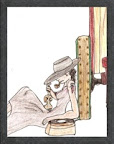Oh to be a little match-seller!
Christmas is here.
I don't like Christmas, I don't think I really ever have, though there have been times when liking the accoutrements has outweighed disliking the holiday. And I do like some of the accoutrements. My dislike of Christmas is not due to people obliging you to buy presents, or anything like that (though I do hate feeling bombarded with advertising, but that's all year, and the price of living in the modern world, a small price to pay). I love Christmas music - this year I memorized all the words to 'Need a Little Christmas', which is, by the way, kind of a weirdly poignant song, in it's way. I even have a strange desire to someday make a fruitcake. In fact, I might even say that I DO enjoy the month of December, just as long as I can manage to keep away from remembering that it ends with Christmas.
But the reminder always comes back. There's something terrifically lonely about Christmas. I don't pretend that's a universal sentiment - one of the things I LOVE about Christmas is that it seems to make other people so happy (sometimes, anyway... and we'll leave it at that ;) ). But there is something, I even remember when I was about 10, the feeling of finishing opening the last gift, and feeling a sinking sense of hollow isolation - the feeling itself isn't odd, but the unique pang of this particular hollowness is special and particular to Christmas, completely irrational, I don't why it feels this way. Christmas is a sort of day of existential loneliness.
Even from a logical point of view, it always disturbed me. When I was a child when I struggled to believe in Jesus Christ in the way that all the people I loved seemed to believe, I remember thinking it was a sad sort of holiday, to sing praises of joy that our brother had descended from the bliss of the heavens, to be born in squalor, live in misery, teach in rejection, and die in agony. Hurrah! Jesus has come to die, because I can't manage to never screw up! I don't mean that sacreligiously, I just never felt like it was a happy idea - I mean, sure it's a feeling of relief, but not 'Joy to the World.' 'I Wonder as I Wander,' which my lost friend Sarah Kortemeier first sang to me, in High School - that's what Christmas felt like, a sort of guilty, lonely penance of a day. A part of the final judgement I always imagined would be that God would place before us all the joys we wanted in life, show us all the good we kept from others for the sake of our own pleasure, and then tell us to eat up, while we watch the sorrow we avoided. That's how Christmas feels to me.
Anyway, enough of that.
I woke up yesterday, with a lead heart, and a swollen self-pitying blah-blah-blah in the back of my throat, and then had to go to work. By the time 1:00 rolled around, I knew that it was time to pull out my secret weapon - the Little Match-Seller, by Hans Christian Anderson.
I love this story. I don't know where I first heard it, except that I was young. I expect it was from my mother, who I seem to borrow from a lot in terms of my personal taste (thank goodness), because whenever I read it, it's easy to imagine my mother crying (if any of my siblings read that sentence, they'll probably chuckle at the idea of mom crying at a Christmas story being peculiiar. If my mom reads the same sentence, she'll stick her tongue out at them. Dad, on the other hand, will probably wisely just feign smiling ignorance). But I remember liking it, that's all I remembered for years, until sometime in High School, when, between less-than-Christmasy internet browsings, I remembered this story, and went and looked it up, and cried my eyes out. It was wonderful, and made me feel much better about Christmas (I think that's the same Christmas where I peeked under the tape on all the presents and figured out all the gifts to me before Christmas came, and then bragged about it too loudly and probably hurt a lot of feelings. Sorry, Jeremy in particular, and while I was way too cool to say so, the Chia Pet-type present would have totally rocked...).
I never really knew why, though. It's not the 'happiest' story in the world. This year, though, I've figured out the trick - in all of Mr. Andersen's best stories there's a trick. And the Little Match Girl? It has a great trick.
When an adult reads a fairy tale, they (generally) seem to read one of about three things into it: either it's an extrapolation on an adult issue, that's too big for kids to understand (think people writing about Sleeping Beauty as a metaphor for sex), or it's a way to affirm values that we adults already (should) have (take, say, Little Red Riding Hood), or else it's a way to escape from being a grownup, and just be a kid. And, the thing is, you can do any of these in this story if you want. That's part of the trick though, because the story is none of these things, at least not the part that gives me a little peace at Christmas time.
The beauty of this story is, much like the book Peter Pan, that it is a story that acknowledges a real, instead of an imagined, power, available to a child, an adult, or any other soul, and it's the sort of power that we, especially we grownups, do not like to acknowledge.
As adults, when a child dies in a story, we want it to be heart-breakingly beautiful. There are good reasons for this - after all, if a child dies, it's a miserable thing. But the truth of the matter is, that having a child be perfect when they die is, sort of, easier for us. It lets us out of thinking about it. It lets us think the child is, sort of, symbolic, angelic. Beyond human control. The child is the consummating, terrible sacrifice, that lets us feel our internal catharsis, without having to face anything new. This is the easiest way to interact with tragedy and childhood, two ideas we do not like to mix.
But, the problem with that is, we don't ever stop and realize why we don't like to mix them - there is a reason. I won't presume to tell perfect truth, but for me, at least, there's two. The first is the kind of reason that doesn't matter - it's not much fun to think of dead kids, and it's even less fun to think of dead kids dying miserable. Dead kids should at least be offered the dignity of being angelic. There is limited usefulness to making people uncomfortable for the sake of discomfort. I do not like ugliness for it's own sake, and dead children are inarguably an ugly thing out of context.
The other reason... well, it's trickier, and it's very related, somehow to Christmas. Dickens fumbles at it in a Christmas Carol, when the Ghost of Christmas Present opens his robe to show the two children, Want and Ignorance, and he points out how ugly they are - not how dirty and miserable, though these are there too, but how inutterably ugly. Scrooge isn't wracked with tormented pity, he's repulsed. The children look like monsters, with claw-like hands and ugly, hateful faces. This is why, when you see a movie with a poor orphan child in it, it's always a poor, waif-like little pale white girl, easy to love. You want to be able to love an orphan. Stories about terrible orphans, miserable, dirty orphans, ugly orphans different than we are, these stories aren't fun, because we don't want to have to feel bad about not loving them. And, as a side note, I imagine it makes it very difficult to be an orphan.
And that's the funny thing about this story. First, the child is classic glurge - she's beaten, she's poor, she's tormented, she's pale and unhappy and lonely in a big world, and we, the readers, we can see what a dear sweet thing she is. Now, before the child dies, Andersen does his first trick, and makes the girl real. He makes her have real, individual little fantasies. We kind of conveniently remember her as just seeing, for instance, a big piping hot dinner (and this is my favorite humanizing touch), but in fact, she sees the goose stand up, all cooked, and walk toward her with the carving tools coming out of his breast. The sheer specificity of this feels human - it's something someone imagines, not something someone imagines that someone would imagine. Suddenly, we can't have all that distance, we're pulled in close, and forced to actually engage with this girl, and not just be the invisible soul on the corner, noting how sad it is. We are involved, we cease to sympathize for this girl, and begin to empathize with this girl.
But, that's not the whole trick, because even then, it's just a particularly well-done piece about how we should realize that we treat other people poorly, in sheer ignorance. A beautiful story, but not as powerful as this story actually is...
The last trick is, if you let yourself fall completely into this child, you realize that these things are real to her. It's not a delusion, it's not some cracked, miserable fantasy. The child is not powerless, waiting for us to save her. The child, deserted by humanity, proceeds to save itself, to create a world that is better than the one she lives in, and then, through sheer moxie, to will that world into being. The girl is not stupid - we see that despite being drudged into a life of misery and shame, she's still very creative, for instance. She knows what's going on, and she knows what, in our little limited world, sitting on that frozen stoop means. She knows the matches won't last, she knows she's settling in to die. But, when the star falls, she does not say it's hers. It's not ignorance, it's not delusional dullness. It's a refusal to be the character in the script that is laid out for her - she is not going to die, even if she does. She's not going to be a powerless, lonely orphan, even if she is one. When her grandmother appears, she could just let her go - she doesn't, she clutches on to her, and refuses to let the world pass. She has created what she wants, she has made it in her own mind, and refuses to return from it to the idiotic world that we grownups left her. And in the end, all of us foolish grownups, we're left to just tut-tut over a poor dead child, and cry and think it's so terribly sad - never realizing that we don't have the right to cry over this girl, we need to cry over ourselves. We're the ones who can't find our way to something better.
Of course, that doesn't mean we should all commit suicide, or anything - the girl didn't kills herself, she just accepted that death was coming. There is more than one way to refuse to live in the world we're given. The operative word is change, and change can come many ways. One could be a Ghandi, for instance, but one need not be. Emily Dickinson created a world to her liking in a different way. So did some of the Mormon forebears I have in my genealogy. So did the Haitian revolutionaries. So do kids who make up imaginary friends. All we can do at Christmas is to fiercely defend our right to live another year - because it is the fierceness that creates the right. All we can do in this world is refuse it, but what power there is in refusal!
Read More......










